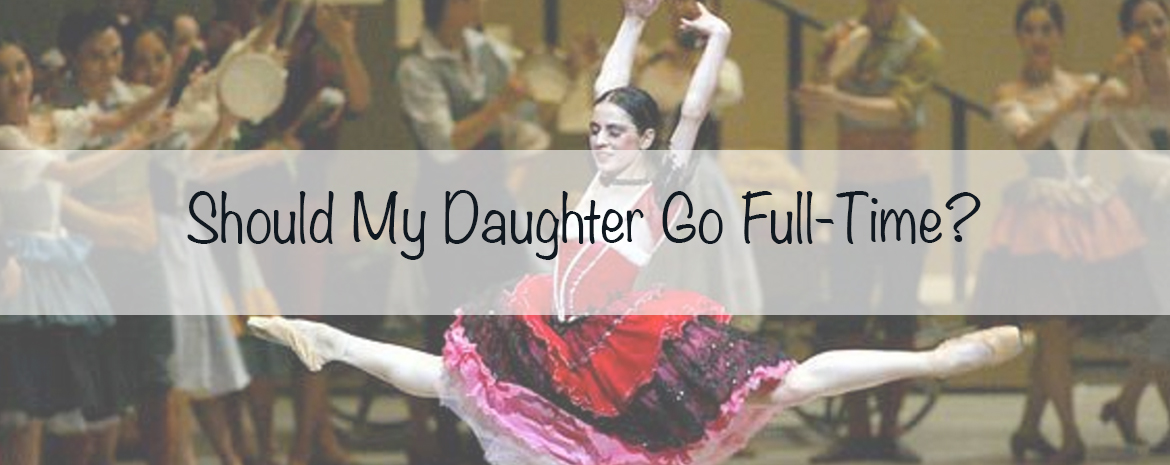My daughter is 14 years old and has been pushing both her father and I in the decision to go into full-time dancing next year. Is this a wise idea, and how will it affect her “employability” later on?
This is a very difficult question and the situation will vary enormously from student to student. I feel that some girls do go into full-time dance training far too readily as many of them will struggle to achieve a career as a dancer. It is a big decision to give up full time schooling for such an unstable career; however it is also important that students are encouraged to follow their dreams rather than feeling that they have to choose the ‘safe’ option. Far too few individuals in our society have any passion for their occupation, so if she simply must dance, then pursuing this path may be right for her. If a child is talented and dedicated and has an absolute passion for dance I would definitely support her in her quest.
Being a professional dancer is an extremely demanding occupation that is far more than just a job. A student must have a passion for dance, a love of exploring their body, and a fascination with how to constantly improve their skill level in all areas of movement and performance to gain any pleasure from it as a career. While it may appear glamorous from the outside, the life of a dancer is often fraught with challenges, rejections and frustrations not to mention being far from lucrative. Many people find it difficult to handle the stresses of the industry, so a strong sense of self and support from family members are crucial to their survival. The dance world is an extremely competitive place and even dancers who have great technique and fantastic presentation may not make it as professional dancers.
While some genera of dance are more forgiving, the physical requirements to get into a classical company can be largely determined by a dancer’s genetics. If she is too tall, too short, too heavy or has disproportionate features and limbs, the fact is that she may find it very hard to get employment. This is hard for any individual to accept, however it must be brought up with families if their daughter is not particularly suited for a career in ballet. This is by no means a reason to stop dancing, and there are some dancers who break the mould completely, however she must be aware that having a successful career may be difficult.
At the other extreme, getting paid to do what you love to do is an amazing position for anyone to be in. Dancers bring mystical worlds to life, bring joy and delight to thousands of people and inspire others to explore their bodies. They achieve a connection with their own body and soul that very few individuals will come close to and will explore the deepest reaches of their being in the name of art.
If a student is contemplating going full-time I would definitely recommend continuing with an academic correspondence course to keep her well educated in all the core subjects. She should research what level of schooling is needed to re-enter the education system if she would like any tertiary education in the future. If, for whatever reason, her dance career does not work out it is important that she has a high enough qualification to be able to study in her chosen area as an adult student. Of course her physical development must also be taken into account, when considering an increase in hours and physical demand of dance lessons. Young bones may be permanently damaged by excessive training en pointe before the growth plates have stabilized enough, and during periods of growth, hip knee and back injuries are common. A study conducted by dance physiotherapists in Sydney, Australia, found that once a dance student below the age of 14 is involved in more than 10 hours of dance per week, her risk of injury to the feet and ankles increases significantly. Once over 14, the body can tolerate more training, provided optimal technique is maintained.
There are many other ways to improve a student’s strength and flexibility apart from her classes in the studio, and for the younger students who want to be doing more, I would suggest investing in supervised Pilates equipment sessions, private ballet lessons to perfect technique or limber and strengthening classes over extra group dance classes. Unfortunately some teachers will take on full-time students despite a lack of potential for the student to have career in ballet in order to keep their student numbers high. This is extremely unfortunate, but as dance schools typically run on a very slim budget, it is a fact of life. If your daughter is serious about doing full-time classes at a particular school she should look at the career paths of previous students to see whether those students are anywhere near where she would ultimately like to be. I feel that not enough students look into the realities of a career in dance before they decide to go full time. This is a very important step to decide if they really want the life of a dancer.
Possible career choices for the serious dance student may include:
• Employment in a classical or contemporary company.
• Creation of or joining an independent modern dance company.
• Contract work for companies as an independent artist.
• Music video and MTV contracts.
• Cabaret style work, for example in ‘The Moulin Rouge’ or on cruise ships.
• Choreography for companies, schools or movies.
• Dance teaching.

